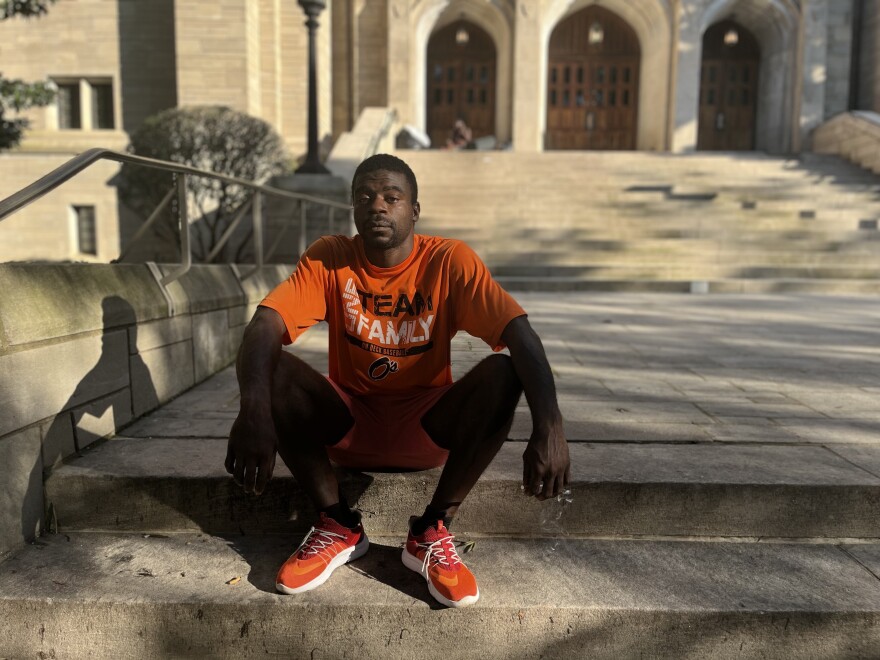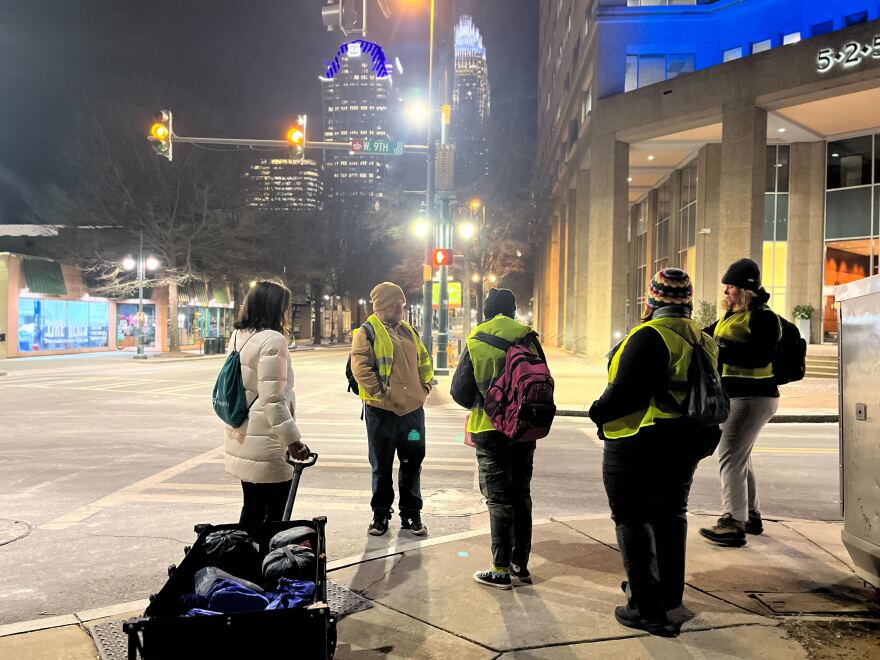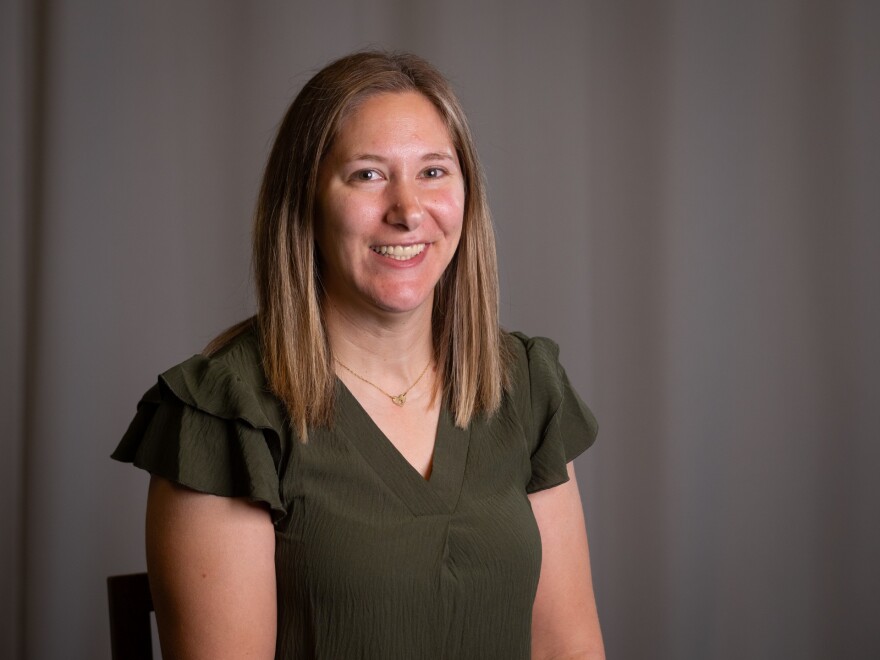A Mecklenburg County report this year found more people sleeping outside now than any year since 2010. In part one of a two-part series, WFAE explores why homelessness remains a pressing issue and why some people sleep on the streets instead of going into shelters.
On a recent morning in uptown, construction workers banged hammers in uptown near First United Methodist Church on North Tryon Street. Sitting on the steps was Brian Gatewood, dressed in his orange T-shirt and matching sneakers that mirrored the summer heat.
For most people, the thought of sleeping outdoors can be daunting, but Gatewood sees it differently.
“No, you’ll just be really thirsty,” Gatewood said. "It'd be hot (and) you start sweating."
Gatewood says there are many reasons why some people prefer being outdoors to going into a shelter, including safety concerns and worries about being exploited.
“Inside the shelter, you're around too many that are not your age, some of them might be your age, and they beg and beg and swear they’re your friend until the dollar hits zero; when the dollar hits zero, it leaves nobody around,” Gatewood said.

He also says crime is a problem. Police reports show dozens of alleged assaults, thefts, harassment, and even a reported arson at the Roof Above shelter in recent years. Those are some reasons why Gatewood says some people prefer to sleep outside rather than in shelters.
“You can get attacked by the same sex, race, and not like it. And you get your money stolen,” Gatewood said.
To address safety concerns, Roof Above told WFAE that staff walk the halls every hour and they screen people for any potential weapons or drugs as they enter and exit the shelters.
A growing number of people on the streets
Since 2022, Mecklenburg County has allocated close to $150 million to addressing homelessness and providing affordable housing. That includes funding for shelter programs, legal services to stop evictions, rental assistance and more. Some of the funds come from the city, while $65 million comes from federal funds from the American Rescue Plan Act. Despite those dollars, the number of people sleeping outdoors continues to rise.
In January, more than 200 volunteers participated in the county’s Point-in-Time Count survey, which assesses the number of people experiencing homelessness. Volunteers with county staff identified 444 people sleeping outdoors in places such as bus stops, cars and tents.
That's 60 more people than last year, and the highest count in 15 years.

What the count also highlighted is how brutal life on the streets can be. Opposite the church where Gatewood sits is the place where Abdul Wright, 52, was found lying dead. The spot is just about a 13-minute walk from Roof Above’s men's shelter.
Liz Clasen-Kelly is the CEO of Roof Above. Speaking with WFAE in June, she reflected on that night in January.
“We had 110 additional people on overflow beds that evening, so I did anticipate our unsheltered numbers would be lower,” Clasen-Kelly said. "So, when we see the significant increase in unsheltered homelessness, despite how cold the temperatures were, despite having no turnaways at shelters, it’s deeply concerning.”
Clasen-Kelly was at the scene during the count with WFAE when a group of volunteers found Wright’s body. They called the police and medics and offered resources that included food and sleeping bags to other people nearby who spotted Wright.
Those who were offered sleeping bags were shocked when they saw Wright lying on the ground. One person who was offered resources said, "Oh my God, that's why I can't go to sleep." That person was comforted by volunteers.
Officials who also arrived talked with those offered sleeping bags and asked questions about whether anyone had seen anything. One person responded by saying, "I just talked to him a couple of hours ago.” Another person who was offered resources started crying, and when asked by officials if they knew Wright, they cried out: "Yes, it's Abdul.”
A state medical examiner's report said Wright died from pneumonia, a lung infection. Wright was Black. Nearly 60% of the people found sleeping outdoors in the Point-In-Time count either identify as Black, African American, or African.
Allison Winston is a social worker who interacted with Wright a few times. Winston used to work for the Charlotte-Mecklenburg Police Department’s Cares Team — a program now under the county. It was started as a way to respond to mostly people experiencing unsheltered homelessness. Winston says she would often come across Wright outside restaurants and buildings in uptown.
“He would express that he wants help. He’s in a bad place. He wants to get back on his meds, and he’s willing to engage. ‘Yes, I’ll do the assessment. I’ll do whatever,’ in order to kind of plug back in,” Winston said. "And other times, he would say that, I think, to make us go away, but in reality — he wasn’t ready.”
A report from the Charlotte Observer found that Wright lived with mental illness. The report also found that Wright was a wrestler, played soccer in Scotland, and was known as a “witty jokester.”
Those are some of the things Winston learned about Wright after he was found dead on the streets.
“That wasn’t always his reality, which I think is more sad to me because that just shows that maybe with a little more help, he could have gotten back to that version of Mr. Wright who was much happier and healthier,” Winston said.

Winston has spent about 10 years working in the homeless field, including at Roof Above when it was known as Urban Ministry. She says, besides mental illness and substance use, some people avoid shelters because of perceptions.
“It has a reputation of ‘oh, it's not safe, it's crowded, it's dirty, it's this or that.' But when you ask them, 'Well, have you actually been there? Have you actually tried it? Well, no, (they say),'” Winston said. “So, I think the shelter has kind of a negative stigma that's not necessarily true, but I think for a lot of people, that type of setting just doesn't work for them.”
Winston now works as a homeless response specialist for Community Solutions, a group that helps cities try to get people like Abdul Wright off the streets.
That’s part one of WFAE’s series that looks at why more people are living outdoors instead of turning to places like shelters. On Monday, we will continue to look at the reasons why and how the county is responding and how shelter programs deal with this complex situation.



